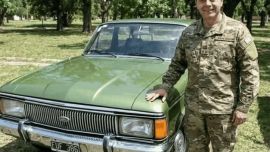“It is what it is” – that’s the line Alberto Fernández repeats about the first year of his presidency, which includes nine months of pandemic.
The evaluation of his government changes from week-to-week, in keeping with the agitated political cycle – late last month the botched security operations surrounding Diego Maradona’s wake constituted a new error which again tarnished the presidency. That came in the same week as such political triumphs as the photograph showing provincial governors approving the bill cutting City funds, which marked a victory over the opposition Juntos por el Cambio coalition, yet new poverty data offer no relief.
Fernández can offer a long list of measures but would highlight two main achievements from the months of coronavirus: restructuring the debt and the resilience of the health system. Looking ahead, he assures that economic recovery and vaccination against Covid-19 will finally mark the government’s take-off.
For some months now, the president has been trying to launch his post-pandemic administration, with the focus on economic recovery. Nevertheless, despite already having the successful negotiation of foreign debt in its pocket and an open dialogue with the International Monetary Fund (IMF), the government faced its most difficult days in October with no peace from the economy or the exchange markets.
“We wanted to emerge from the pandemic and we couldn’t but now we can,” says one optimistic minister.
The government is seeking to revert the paralysis that has dominated much of its first year in office. Thus Congress will be in session all summer with 25 bills sent by the Executive branch for debate in extraordinary sessions, with some ministers already warning that there will not be any holidays for anybody. Poverty data provides no breathing room for a presidency which repeatedly says that it came to rescue the neediest.
“If there had been no state aid with programmes reaching millions of Argentines, 10 percent more people would have been below the poverty line with destitution even worse. We injected almost six percent of Gross Domestic Product into the economy,” explains an official.
A whole bunch of aid packages have been lined up to help those in need through this most critical month of December: 22 billion pesos in AUH family benefits for vaccination certificates and the support of school attendance, as well as the extension of the programme to those unable to register to date; duplication of the amounts of food covered by the Tarjeta Alimentar card; 1.7 million Christmas hampers; 15 billion pesos to boost food supplies to municipalities and soup kitchens; 9.4 billion more pesos monthly for the Potenciar Trabajo job creation programme; launching the Potenciar Joven youth training scheme with monthly scholarships of 8,500 pesos: health bonds through December; ATP and Repro II wage supplements, the former created during the pandemic and extended for the most critical sectors; and loans to companies at subsidised interest rates.
The way out
“There have been many criticisms of the handling of the pandemic but placing the health system in the condition it is today would not have been possible even in 10 years if we did not have to face coronavirus,” they explain in the Casa Rosada.
The economy is showing signs of recovery but in the government they know and admit that “there is no economy without vaccination.”
“And the vaccine will be there,” they add, while heaving a sigh of relief. In an election year the government will have to deliver the most ambitious vaccination plan in history.
“The popular mood will change drastically between economic recovery after a steep fall and the feeling of leaving the pandemic behind with the vaccine,” say sources close to Fernández.
The president enjoyed his highest polling performance in March when first announcing the restrictions. “We always knew that the numbers giving him 80 percent acceptance were only a short-term loan,” they say in the Olivos presidential residence. They recognise that back then was the first time that there were no doubts about the authority of Alberto Fernández: “He was the president and all society was inclined to heed what he asked.”
But the old campaign discussion over the role of Cristina Fernández de Kirchner returned a few months later. The president knows that the question of who really governs will also accompany him for the next three years of his term.
Infighting
Fernández responds pragmatically to the internal differences, as was again demonstrated last week when he agreed to change the bill updating pensions. The political decision had been taken by his vice-president.
At the start of the presidency both leaders took care of appearances, in order to banish the spectre of infighting, something they no longer do. The Fernández de Kirchner publicly marks the differences, the president denies them in the media – while confessing them to his closest friends when they visit him at the presidential residence.
In late October one leader heard Fernández say that he was conceding the Federal Investment Council (with an annual budget of nine billion pesos) to La Cámpora, saying it was the last thing he would give Kirchnerismo. Shortly afterwards, that sector took over the Housing Ministry via then-Avellaneda mayor Jorge Ferraresi.
Meanwhile another group of mayors, more pro-Alberto than Kirchnerite, is awaiting gestures which Fernández has promised but delays, such as heading the Argentine Federation of Municipalities.
“Alberto has not understood that he is the president with the votes and that all the rest of his Cabinet is at the mercy of a decree,” they say from Congress about the repeatedly questioned officials.
“Perhaps he does understand but taking one out would not be replaced by the sector of his alliance gaining the post last December but by Kirchnerismo,” they admit in the Pink House.
Nevertheless, Frente de Todos will stay united. No leader of that electoral alliance is ready for a rift which would hand triumph to the opposition.
























Comments